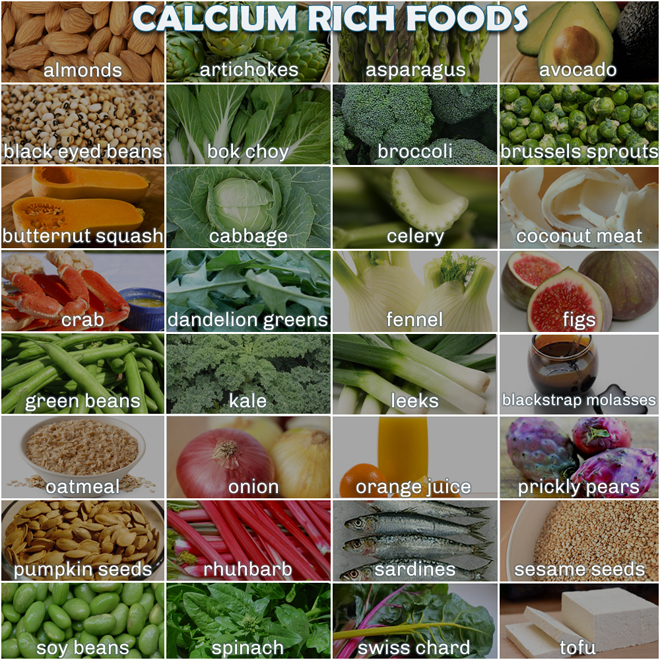In my opinion it is vital to take vitamin and mineral supplements because we do not get enough from our food due to the way it is grown and processed these days. However it is also important to eat good wholesome foods, nothing processed and especially fresh fruits and vegetables.
The vitamins and minerals that you get from your foods are often more easily absorbed than those that you get in a supplement form, and this is especially so for organic calcium. I am going to write about 4 calcium rich foods that will help to increase your calcium levels in your body and also make you more alkaline which is so important for optimum health.
You may be surprised that I do not include milk in this list, a product that we are always being told to increase for osteoporosis, but milk is so acidifying that the calcium in it is cancelled out and infact it causes you to lose calcium from your bones!
So which foods are good for bone strength?
1. Almonds – (raw and whole) – ¼ of a cup gives 94mg of calcium.
Almonds are related to peaches and apricots and are the seed of the fruit. They are a great snack to take around with you and are good in both sweet and savoury dishes.
Almonds can keep your bones young and healthy because of the high amount of bioavailable calcium, and they also contain vitamin E, manganese, copper and magnesium, all of which help to keep your bones youthful and strong.
Almonds are one of the few alkalising nuts and are high in monounsaturated fats, omega 3s, the same type as found in olive oil. These fats promote calcium absorption and enhance the synthesis of collagen.
The same healthy fats in almonds that promote strong bones, also prevent cardiovascular disease due to the antioxidant action of vitamin E and to the cholesterol-reducing effect of the monounsaturated fats. Almonds are high in magnesium, a mineral that contributes to a healthy heart, and also potassium, but very little sodium therefore providing a protective effect against high blood pressure and artherosclerosis.
2. Broccoli (cooked) – 1 cup gives 62 mg calcium, (raw) – 1 cup gives 43 mg calcium.
Broccoli is a cruciferous vegetable in the same family as cauliflower and cabbage. Steamed it has quite a bit of calcium and it also contains vitamin A and K that are important precursors for vitamin D metabolism. It is rich in vitamin B, manganese, vitamin E, choline, potassium and copper. It also contains vitamin C as an antioxidant.
Broccoli has a significant detoxifying effect on the body because it contains d-glucarate, a chemical in the liver that signals your body to ‘let go’ of toxins. It does this by suppressing an enzyme that tells your body to ‘hold on’ to toxins.
Broccoli contains Omega-3 fatty acids, one cup has 200mg of alpha-linoleic acids (ALAs), a great anti-inflammatory.
Broccoli is strongly implicated in cancer prevention due to its ability to break the cancerous cycle of chronic inflammation and oxidative stress.
3. Kale (cooked) – 1 cup gives 179mg calcium, (raw) – 1 cup gives 137mg calcium
Another cruciferous vegetable, full of bioavailable calcium. It also contains a huge amount of vitamin K, 1062 microgms per cooked cup. Vitamin K regulates osteoclast production, these are the bone cells that resorb bone tissue, a function that is critical in the maintenance and repair of compact bones. The calcification of bones is dependent on vitamin K because it activates osteocalcin, a Gla protein, thought to play a role in the body’s metabolic regulation and in bone building.
Kale also contains an impressive amount of vitamin A and C and is rich in B vitamins, magnesium and even Omega-3 fats.
The antioxidant content of kale and anti-inflammatory nutrients make it a top choice for cancer prevention and research now shows that it lowers cholesterol. The fibre in kale binds to some of the bile acids present in your intestines. The liver uses cholesterol to build bile so when the fibre binds to the bile acids the liver draws on cholesterol stores to build more bile, so keeping cholesterol moving and therefore lowering it in your blood.
4. Sesame Seeds (raw) – ¼ of a cup gives 351mg calcium
These tiny seeds are nutrient rich and the world’s oldest condiment having been grown since prehistory. The amount of calcium in ¼ cup is more that in a full cup of milk!
They contain copper, zinc and manganese all 3 of which work together to build Superoxide Dismutase (SOD) and essential antioxidant that your bones need to be flexible and strong. Low levels of zinc are directly linked to osteoporosis of the spine and hips. SOD targets the most common free radicals peroxide and superoxide, preventing oxidative stress and staving off the effects of ageing.
Sesame seeds also contain magnesium and B1, and the copper in them is well known for reducing arthritic pain and swelling, due to the fact that they are involved in multiple anti-inflammatory enzyme processes. Copper also helps in the production of collagen and elastin which are vital for the youthful flexibility of bone, for keeping your skin looking young, and for the elasticity of blood vessels.
The calcium and magnesium content of sesame seeds helps to stave off migraines and magnesium is known to restore healthful sleep patterns especially during the menopause.
So to help keep your bones strong eat plenty of good green vegetables such as kale and broccoli, sprinkle sesame seeds on your salads and snack on almonds.

